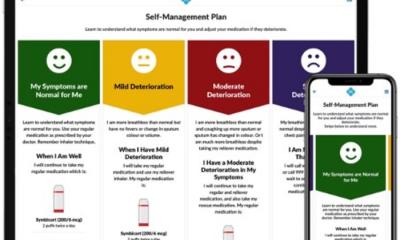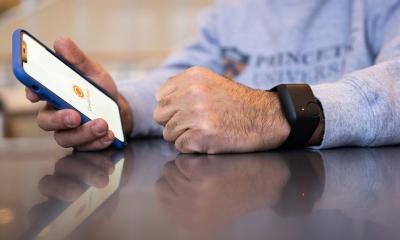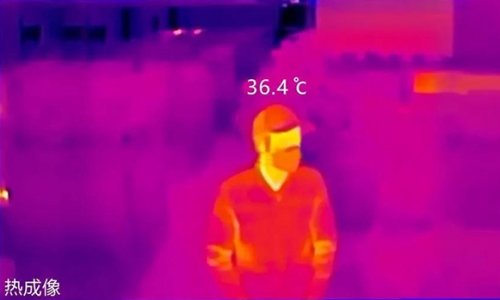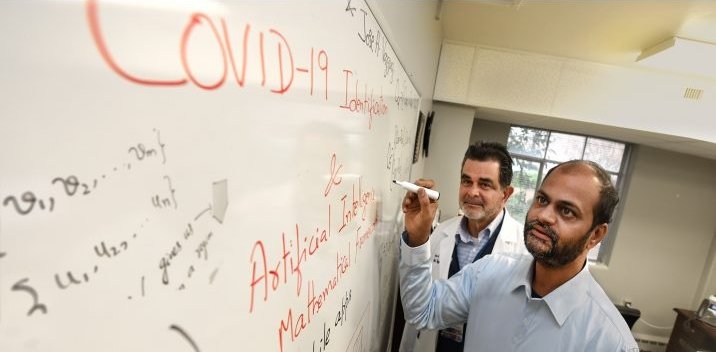
Image source: Augusta University
News • At-home testing for COVID-19
Coronavirus testing? There's an app for that
A coronavirus app coupled with machine intelligence will soon enable an individual to get an at-home risk assessment based on how they feel and where they’ve been in about a minute, and direct those deemed at risk to the nearest definitive testing facility, investigators say.
It will also help provide local and public health officials with real time information on emerging demographics of those most at risk for coronavirus so they can better target prevention and treatment initiatives, the Medical College of Georgia investigators report in the journal Infection Control & Hospital Epidemiology.
“We wanted to help identify people who are at high risk for coronavirus, help expedite their access to screening and to medical care and reduce spread of this infectious disease,” says Dr. Arni S.R. Srinivasa Rao, director of the Laboratory for Theory and Mathematical Modeling in the MCG Division of Infectious Diseases at Augusta University and the study’s corresponding author. Rao and co-author Dr. Jose Vazquez, chief of the MCG Division of Infectious Diseases, are working with developers to finalize the app which should be available within a few weeks and will be free because it addresses a public health concern.
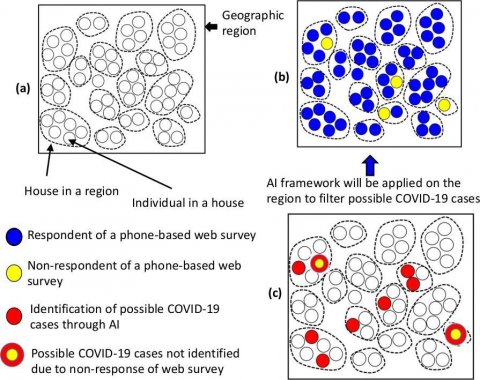
Image source: Rao et al., 2020, Infection Control & Hospital Epidemiology (CC BY 4.0)
The app will ask individuals where they live; other demographics like gender, age and race; and about recent contact with an individual known to have coronavirus or who has traveled to areas, like Italy and China, with a relatively high incidence of the viral infection in the last 14 days. It will also ask about common symptoms of infection and their duration including fever, cough, shortness of breath, fatigue, sputum production, headache, diarrhea and pneumonia. It will also enable collection of similar information for those who live with the individual but who cannot fill out their own survey. Artificial intelligence will then use an algorithm Rao developed to rapidly assess the individual’s information, send them a risk assessment — no risk, minimal risk, moderate or high risk — and alert the nearest facility with testing ability that a health check is likely needed. If the patient is unable to travel, the nearest facility will be notified of the need for a mobile health check and possible remote testing.
It is imperative that we evaluate novel models in an attempt to control the rapidly spreading virus
Arni S.R. Srinivasa Rao, Jose Vazquez
The collective information of many individuals will aid rapid and accurate identification of geographic regions, including cities, counties, towns and villages, where the virus is circulating, and the relative risk in that region so health care facilities and providers can better prepare resources that may be needed, Rao says. It also will help investigators learn more about how the virus is spreading, the investigators say. Once the app is ready, it will live on the augusta.edu domain and likely in app stores on the iOS and Android platforms.
"It is imperative that we evaluate novel models in an attempt to control the rapidly spreading virus", Rao and Vazquez write. Technology can assist faster identification of possible cases and aid timely intervention, they say, noting the coronavirus app could be easily adapted for other infectious diseases. The accessibility and rapidity of the app coupled with machine intelligence means it also could be utilized for screening wherever large crowds gather, such as major sporting events.
While symptoms like fever and cough are a wide net, they are needed in order to not miss patients, Vazquez notes. “We are trying to decrease the exposure of people who are sick to people who are not sick,” says Vazquez. We also want to ensure that people who are infected get a definitive diagnosis and get the supportive care they may need, he says.
While stressing that the infection with coronavirus is not a pandemic— defined by the World Health Organization, as the worldwide spread of a new disease, including numerous flu pandemics like H1N1, or swine flu, in which people find themselves exposed to a virus for which they have no immunity — “This is what you have to do with pandemics,” says Vazquez. “You don’t want to expose an infected person to an uninfected person.” If problems with infections persist and grow, drive-thru testing sites may be another need, he says.
The investigators hope this readily available method to assess an individual’s risk will actually help quell any developing panic or undue concern over coronavirus, or COVID-19. “People will not have to wait for hospitals to screen them directly,” says Rao. “We want to simplify people’s lives and calm their concerns by getting information directly to them.”
Recommended article
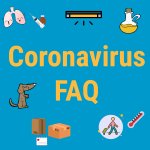
News • Myths around SARS-CoV-2 busted
Coronavirus FAQ to dispel fake and harmful advice
The current outbreak of the novel coronavirus disease (COVID-19) is making headlines by the minute. However, some less-than-trustworthy advice can be found among the information. Understandably, many people are concerned and confused. To prevent unnecessary panic, the World Health Organisation (WHO) has assembled advice for the public. Is it safe to receive parcels from China? Will sesame oil…
If concern about coronavirus prompted a lot of people to show up at hospitals, many of which already are at capacity with flu cases, it would further overwhelm those facilities and increase potential exposure for those who come, says Vazquez.
Tests for the coronavirus, which include a nostril and mouth swab and sputum analysis, are now being more widely distributed by the CDC, and the Food and Drug Administration also has given permission to some of the more sophisticated labs, particularly those at academic medical centers like Augusta University Medical Center, to use their own methods to look for signs of the viral infection, which the hospital will be pursuing.
As of this week, about 90,000 cases of coronavirus have been reported in 62 countries, with China having the most cases. The CDC and WHO say that health care providers should obtain a detailed travel history of individuals being evaluated with fever and acute respiratory illness. They also have recommendations in place for how to prevent spread of the disease while treating patients. Currently, when people do present, for example, at the Emergency Department at AU Medical Center, with concerns about the virus, they are brought in by a separate entrance and escorted to a negative pressure room by employees dressed in hazmat suits per CDC protocols, Vazquez says. As of today, all those who have presented at AU Medical Center have tested negative, he says.
Source: Augusta University
07.03.2020



